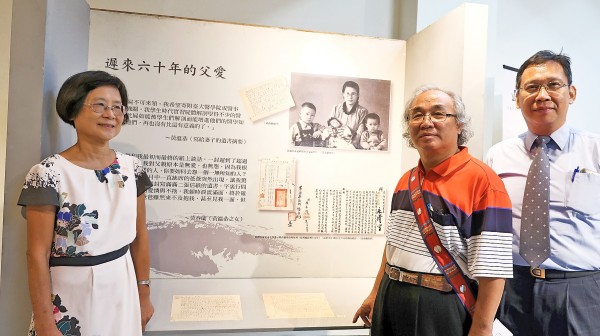《TAIPEI TIMES》 Exhibition in Pingtung shows farewell letters of White Terror era prisoners

National Kaohsiung Marine University professor Huang Chun-lan, daughter of White Terror victim Huang Wen-kung, Pingtung County Cultural Affairs Department director Wu Ching-fa and Ministry of Culture Preparatory Office of the National Human Rights Museum editor Tu Chien-feng, left to right, on Friday attend a new exhibition featuring letters by political prisoners to their families during the White Terror era now on in Pingtung County. Photo: Lo Hsin-chen, Taipei Times
By Lo Hsin-chen / Staff reporter
Letters written by White Terror-era political prisoners to their families are on display in Pingtung.
The White Terror era refers to the suppression of political dissidents following the 228 Incident, an uprising that began on Feb. 27, 1947, which was brutally suppressed by the then-Chinese nationalist Party (KMT) regime, and the later imposition of martial law, which was not lifted until July 15, 1987.
During the White Terror, 140,000 to 200,000 people — many of whom were considered intellectual and social elites — were imprisoned and more than 1,000 were killed.
The exhibition, titled Belated Love: Farewell Letters of the Politically Persecuted in the White Terror Era (遲來的愛— 白色恐怖時期政治受難者遺書特展), has been put together by the Ministry of Culture and the Pingtung County Government.
It displays farewell letters from 10 victims of political persecution, including Huang Wen-kung (黃溫恭), Ho Chuan (何川), Huang Tien (黃天), Kao Yi-sheng (高一生), Huang Hsien-chung (黃賢忠), Wang Yao-hsun (王耀勳), Kuo Ching (郭慶), Tsai Tieh-cheng (蔡鐵城), Chen Chen-chi (陳振奇) and Chiu Hsing-sheng (邱興生).
“I was only five months old when my father [Huang Wen-kung] was arrested. I cried when I first read his farewell letter,” National Kaohsiung Marine University professor Huang Chun-lan (黃春蘭) said on Friday.
Huang Chun-lan said her father was born in Kaohsiung’s Lujhu District (路竹) and was the first dentist in the area.
After the 228 Incident, her family relocated to Pingtung’s Chunrih Township (春日), where he worked as the director of the township’s health center and improved hygienic conditions for Aboriginal communities and the survival rate of newborn infants, she said.
Huang Wen-kung wrote five farewell letters to his family before his execution in 1953, but they were only given to his family 58 years after his death, department director Wu Ching-fa (吳錦發) said.
“My dearest Chun-lan: While you are still in your mother’s womb, I have been arrested. How sorrowful it is that we cannot see each other in person. Nothing is more miserable than this,” one of the letters said.
It has been 30 years since the lifting of martial law, but most people have only a fragmented understanding of the time, Wu said.
The government is obliged to ensure historical justice for the families of the persecuted and to give the next generation access to the historical truth, she added.
The letters are valuable because they are the last confessions of the politically persecuted, who wrote them on the eve of their executions, Preparatory Office of the National Human Rights Museum editor and reviewer Tu Chien-feng (杜劍鋒) said.
Hopefully, through the letters, more people could learn how the persecuted died for their ideals, he added.
The exhibition is to run untill Oct. 15 at the county government’s Cultural Affairs Department.
新聞來源:TAIPEI TIMES
















